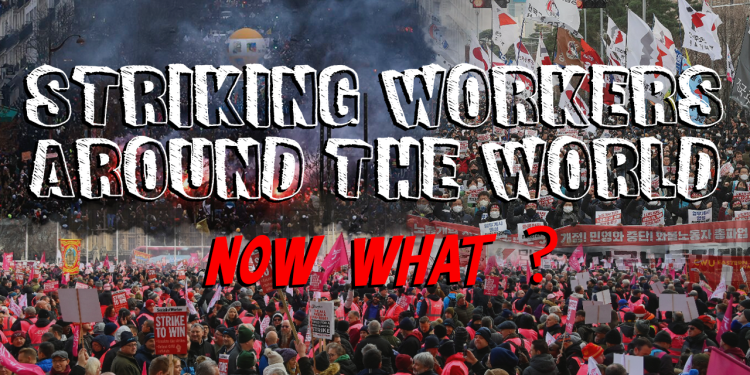NEWS CENTER – Strikes and mobilizations of workers have taken to the streets around the world as the conditions of capitalist modernity worsen over the years. The crisis of the system, which has deepened since the financial crisis of 2008, has taken a step further with the economic consequences at the market level after the Coronavirus pandemic. Due to the system’s need for survival of capitalist modernity, the living conditions of the working class have been affected and a wave of labor and pension reforms have been introduced by states in different parts of the world.
The UK recorded the highest number of working days lost to labor disputes in 2022 for more than 30 years, official data showed on Tuesday, as a cost of living crisis prompted employees to leave in demand for higher wages. The Office for National Statistics (ONS) said that nearly 2.5 million workdays were lost to industrial action last year, the most since 1989, when 4.1 million days were lost. Millions of workers took to the streets of the capital, London, in a way not seen for a long time in the UK – one of the centers of global capitalist hegemonic power.

France has been facing strong street protests, and transport workers and refinery employees have begun strikes over Emmanuel Macron’s plan to raise the retirement age to 64. For the sixth time since the beginning of the year, unions have called for a national day of strikes and demonstrations, aiming to repeat the large turnout seen at the first major protest on January 19, when more than a million people marched against the pension changes.
The disruption is expected to be bigger and last longer, as rail unions have called for rolling and open strikes, which could affect all national trains as well as international routes, including the Eurostar. Local city buses and subway trains in major cities have been affected, as have airlines, with up to 30% of flights cancelled on Tuesday and Wednesday as air traffic controllers strike. Encouraged by united unions, the tug-of-war between the street and the government over Emmanuel Macron’s pension reform had taken the form of strikes and demonstrations since mid-January. Meanwhile, a growing majority of French people and protesters reject the legislation, which wants to raise the minimum retirement age from 62 to 64.

Far from being an exception, March 16 marks the 100th time under France’s Fifth Republic that the executive has chosen to use special powers to force through an unpopular measure. President Macron used the article once in his first term (2017-2022), and 11 times since the beginning of his second term in June 2022. Introduced in the Constitution of the Fifth Republic in 1958, authored by Michel Debré, Article 19 paragraph 3 of the French Constitution – known widely as “49.3” – was intended to “streamline” the parliamentary system and resolve crises and deadlocks by handing over the reins to the executive. Since the Prime Minister’s approval of Article 49.3 thousands of people have spontaneously demonstrated around the country and new strikes are being called by labor unions.
Tens of thousands of education workers in the second largest school district in the United States, the Los Angeles Unified School District, walked off the job to demand higher wages and staffing levels. The three-day strike began on Tuesday with demonstrations organized by members of Local 99 of the Service Employees International Union, which represents some 30,000 teacher aides, special education assistants, bus drivers, custodians and other support staff. The workers joined the picket lines early in the morning amid thunderstorms with a few signs that read, “We Keep Schools Safe, Respect Us! They were joined by support teachers who also work in the district, which has over 500,000 students from Los Angeles, California, and all or part of 25 other cities and surrounding areas.

It is clear that the current state of the system of capitalist modernity, which has been in crisis for years, has reached breaking points. To the extent that the line of contradictions between the hegemonic powers has led to greater indirect participation in the Ukraine War, the third world war continues to deepen and increase the risks of direct armed confrontation between such powers. Just like the first great war, known to have been motivated by imperialist interests, the working class must see its role in society and not fall into the mistakes made a hundred years ago, when young people and workers were sent to the battlefield as cannon fodder and died by the millions in the battlefields for strengthening the power of their nation states and their elites.
The class struggle is still alive, but it must avoid falling into the mistakes of the 20th century struggle’s, in which it was not able to encompass the whole life line itself and bring about a change of mentality and system for society, and consequently, for the working class. The Revolution in Kurdistan and the praxis of Rojava once again presents itself as a viable and radical alternative for the construction of a socialist system that embraces all layers of social change and creates a new perspective for life and struggle. At a juncture of deepening crisis, the opportunity arises to build the new alternative and develop the radical alternative to the system of capitalist modernity.
Connecting with the revolutionary struggle of Kurdistan and knowing it in depth as well as its internationalist line and perspective for the struggle of peoples and brotherhood of peoples is crucial at this time, an overdue task indeed. But there is still time, and what is not lacking at this time are opportunities for this necessary and strategic approximation between the struggles of the peoples.
NC/Cêmil Cûdî




